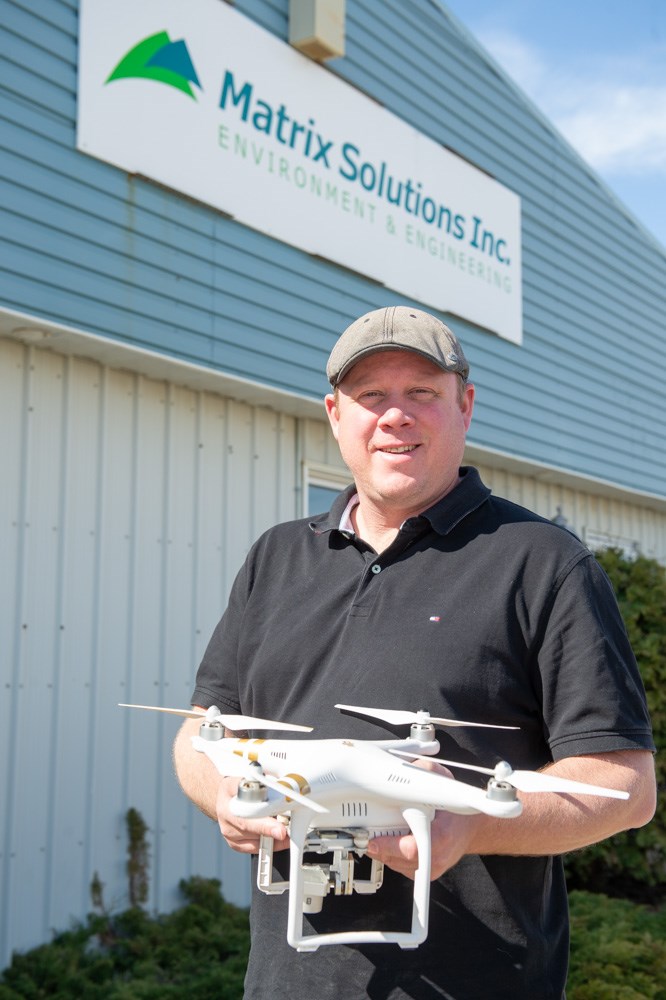Weyburn – Long before you couple pick up a highly capable quadcopter drone from an electronics store for a few grand, Matrix Solutions was one of the leaders in the usage of unmanned aerial vehicles for environmental work.
Starting around 2006, their Weyburn office had both a helicopter and fixed wing drone, both large enough to take up a substantial part of pickup truck bed.
These days they’re using something much smaller, a system that fits in a large Pelican case.
“We’ve gone away from the big drone, the airplane one, and the helicopter, and we’ve got DJI Phantoms,” said Trevor McMorris, general manager in Weyburn.
The newer technology is dramatically improved as time as gone on.
“For us, the biggest thing with the UAVs is keeping up with the changing regulations,” he noted.
Volumetric measurement is a recent development. Flying a drone overhead now allows the operator to determine how much volume is in something like a pile.
“We can fly over a landfill and get the volume. We compared to an actual survey, and it was within two per cent,” McMorris said.
So why’s this important?
“We are an environmental consulting company that focuses on predevelopment, remediation and reclamation for oil and gas.”
They also work in the potash sector and emergency spill response.
In Weyburn, 90 per cent of their work is oil and gas, 10 per cent is mining.
A recent project included doing work with some Indigenous monitors on the Line 3 Replacement project.
Matrix employs 22 people in Weyburn and a further six in Oxbow. The have other locations in Lloydminster, Swift Current, Kindersley, Saskatoon, and Virden, Manitoba, as well as multiple locations in Alberta and British Columbia. Headquarters is in Calgary.
“We’ve got a pretty significant group in Ontario, now,” he added.
“Here we’ve got environmental engineers, engineering techs, agrologists, agricultural technicians, biologists, chemists, geologists and hydrogeologists.”
McMorris’ specialty is as an agrologist. He’s been with Matrix for 16 years in Weyburn.
“It’s nice to have. It’s easy. We can go to a spill or fly a site and be able to send a photo from the field into somebody in the office here, or even in Calgary, so they can see in almost real-time what we’re seeing. And they’ve gotten to the point where the technology is so much better. They’re easier to fly. They fit in a briefcase, not a half-ton truck box to haul them around.”
Sometimes they mount near-infrared cameras on airplanes for certain uses. “We’ve got it to the point where our people in Regina have developed algorithms for it to tell the difference in colour between coshe and canola in a field.”
The UAVs get used weekly, if not daily.
Asked how they handled the downturn, McMorris said, “When oil dropped, we slowed down. When things were busy, we had people with banked hours, so we were able to get through.”
Their staff each had hundreds of hours of banked time from when things were busier that they were able to draw from.
But several years into this, there’s been something of a change of perspective on the business climate, according to McMorris.
“The last couple years have been good. This isn’t a downturn. It’s more of a reality now, and we’ve stopped feeling sorry for ourselves and have turned it around and are going after things and trying to live with the new norm.
“We hired three people at the end of last year, probably the first new people we’ve hired in five years. We just hired four fulltime people and one summer student for Weyburn and Oxbow last month, in addition to the three last fall.”
This backfilled some attrition over the years as people advanced with their career.
“The nice thing with the company in general is just because you’re an agrologist or engineer, it doesn’t mean you’re pigeon-holed into that type of work. We like to cross-train everybody to diversify their skill set. I think that’s where it’s helped during these slow times. Everybody can do a little of everything. They’re not so specialized that if that work has completely dried up, they can’t pick up something else,” he said.
Asked about the mood, he said, “For our office, specifically, it’s a lot more optimism. We’re not waiting for $120 per barrel oil.
“There is work to be had.”
“I think all the clients we work for, down here, are very proactive. They’re managing their liabilities on their own, rather than being forced by a government policy. They’re very proactive. They’ve got plans that aren’t just one year, or a certain period of time. They’re looking at longer term issues,” he said.
Will abandonments be a growth area?
“If they can’t sit suspended for a certain length of time, it will, for sure, help us out, if we can get the work.”
The aftershocks of Trident Exploration’s shutting down in Alberta recently will have an impact on the industry.
“It’s definitely going to have them looking harder on what that levy is and how they calculate who has to pay what,” McMorris said.
Regarding trends, he said over the last 16 years, the regulations have tightened up. That includes more specific remediation criteria, and specialists like agrologists or environmental engineers needed.
One area that will soon be getting a lot of attention are new federal methane regulations. To that end, he said Matrix Solutions has looking into getting infrared cameras for leak detection.
“The biggest thing for us has been a change in mentality. This is the new reality. This is where we’re at. We’ve done hiring because we feel we have the workload. Our clients are really good, and they’re proactive with the environmental work they’re doing.”
��




